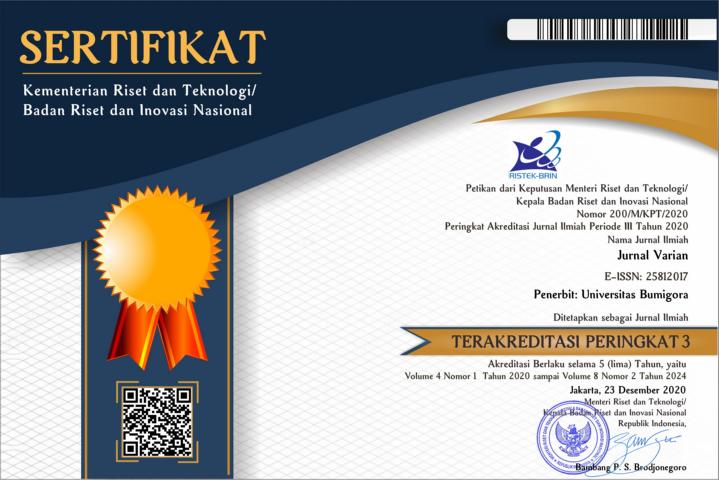A Regression Model of Public Interest in COVID-19 Vaccination Ahead of MotoGP
Abstract
The lack of a threshold value for herd immunity against COVID-19 ahead of the MotoGP 2022 Event in the Mandalika Circuit Area, Central Lombok Regency is the reason for the author to conduct this research. The objectives of this research are 1) to make a mathematical model of the interest of the people of Central Lombok Regency in the Covid-19 vaccination in welcoming the 2022 MotoGP Event and 2) to determine the influence of MotoGP Event 2022 and other factors on the interest of the people of Central Lombok Regency in carrying out the COVID-19 vaccination. This research is a type of quantitative descriptive research. The independent variables in this study are the variables of ease of getting the Covid-19 vaccination (X1), the efficacy of the COVID-19 vaccination (X2), trust in the government (X3), and the 2022 MotoGP event (X4), while the dependent variable is the variable of interest in covid-19 vaccination (Y). To achieve the objectives of this study, the authors collected data through a questionnaire that was distributed to 332 respondents, they’re people who received the full vaccine aged 12-70 years. The questionnaire was tested for validity and reliability. Data must first be transformed into interval data using the Method of Successive Interval (MSI) then analyzed using multiple linear regression with classical assumptions including normality, multicolllinearity and heteroskedasticity. The results showed that the 2022 MotoGP event did not have a significant effect on the interest of the people of central Lombok Regency to take part in the COVID-19 vaccination. The biggest factor that influences is the factor of people's trust in the government.
References
development region of northern part of west java. The International Archives of the Photogrammetry, Remote Sensing and Spatial
Information Sciences, 41:205–210. https://doi.org/10.5194/isprsarchives-XLI-B6-205-2016.
Akther, T. and Nur, T. (2022). A model of factors influencing covid-19 vaccine acceptance: A synthesis of the theory of reasoned
action, conspiracy theory belief, awareness, perceived usefulness, and perceived ease of use. PLoS One, 17(1):e0261869. https:
//doi.org/10.1371/journal.pone.0261869.
Vol. 7, No. 2, April 2024, Hal. 157–170
DOI: https://doi.org/10.30812/varian.v7i2.3130
168 | Elok Faiqotul Himmah JURNAL VARIAN | e-ISSN: 2581-2017
Asdar, B. (2011). Method of successive interval in community research: Ordinal transformation data to interval data in mathematic
education study. International Journal of Social Science and Humanities Research, 4(2):356–363.
Cerda, A. A. and Garc´ıa, L. Y. (2021). Hesitation and refusal factors in individuals’ decision-making processes regarding a coronavirus disease 2019 vaccination. Frontiers in public health, 9:626852. https://doi.org/10.3389/fpubh.2021.626852.
El-Elimat, T., AbuAlSamen, M. M., Almomani, B. A., Al-Sawalha, N. A., and Alali, F. Q. (2021). Acceptance and attitudes toward
covid-19 vaccines: A cross-sectional study from jordan. Plos one, 16(4):e0250555. https://doi.org/10.1371/journal.pone.0250555.
Faturohman, T., Kengsiswoyo, G. A. N., Harapan, H., Zailani, S., Rahadi, R. A., and Arief, N. N. (2021). Factors influencing covid19 vaccine acceptance in indonesia: an adoption of technology acceptance model. F1000Research, 10. https://doi.org/10.12688/
f1000research.53506.1.
Halunga, A. G., Orme, C. D., and Yamagata, T. (2017). A heteroskedasticity robust breusch–pagan test for contemporaneous correlation in dynamic panel data models. Journal of econometrics, 198(2):209–230. https://doi.org/10.1016/j.jeconom.2016.12.005.
Harapan, H., Anwar, S., Setiawan, A. M., Sasmono, R. T., et al. (2016). Dengue vaccine acceptance and associated factors in
indonesia: A community-based cross-sectional survey in aceh. Vaccine, 34(32):3670–3675. https://doi.org/10.1016/j.vaccine.
2016.05.026.
Harapan, H., Wagner, A. L., Yufika, A., Winardi, W., Anwar, S., Gan, A. K., Setiawan, A. M., Rajamoorthy, Y., Sofyan, H., and
Mudatsir, M. (2020). Acceptance of a covid-19 vaccine in southeast asia: a cross-sectional study in indonesia. Frontiers in public
health, 8:381. https://doi.org/10.3389/fpubh.2020.00381.
Irfan, M., Shahid, A. L., Ahmad, M., Iqbal, W., Elavarasan, R. M., Ren, S., and Hussain, A. (2022). Assessment of public intention
to get vaccination against covid-19: Evidence from a developing country. Journal of Evaluation in Clinical Practice, 28(1):63–73.
https://doi.org/10.1111/jep.13611.
Jiang, N., Gu, P., Liu, K., Song, N., and Jiang, X. (2021). Acceptance of covid-19 vaccines among college students: a study of
the attitudes, knowledge, and willingness of students to vaccinate. Human Vaccines & Immunotherapeutics, 17(12):4914–4924.
https://doi.org/10.1080/21645515.2021.2013077.
Kadkhoda, K. (2021). Herd immunity to covid-19: alluring and elusive. https://doi.org/10.1093/ajcp/aqaa272.
Kerr, J. R., Freeman, A. L., Marteau, T. M., and van der Linden, S. (2021). Effect of information about covid-19 vaccine effectiveness
and side effects on behavioural intentions: two online experiments. Vaccines, 9(4):379. https://doi.org/10.3390/vaccines9040379.
Lasmita, Y., Misnaniarti, M., and Idris, H. (2021). Analisis penerimaan vaksinasi covid-19 di kalangan masyarakat. Jurnal Kesmas
(Kesehatan Masyarakat) Khatulistiwa, 8(4):195. https://doi.org/10.29406/jkmk.v9i4.3056.
Lazarus, J. V., Ratzan, S. C., Palayew, A., Gostin, L. O., Larson, H. J., Rabin, K., Kimball, S., and El-Mohandes, A. (2021).
A global survey of potential acceptance of a covid-19 vaccine. Nature medicine, 27(2):225–228. https://doi.org/10.1038/
s41591-020-1124-9.
Mir, H. H., Parveen, S., Mullick, N. H., and Nabi, S. (2021). Using structural equation modeling to predict indian people’s attitudes
and intentions towards covid-19 vaccination. Diabetes & Metabolic Syndrome: Clinical Research & Reviews, 15(3):1017–1022.
https://doi.org/10.1016/j.dsx.2021.05.006.
Mishra, P., Pandey, C. M., Singh, U., Gupta, A., Sahu, C., and Keshri, A. (2019). Descriptive statistics and normality tests for
statistical data. Annals of cardiac anaesthesia, 22(1):67–72. https://doi.org/10.4103/aca.ACA 157 18.
Ningsih, S. and Dukalang, H. H. (2019). Penerapan metode suksesif interval pada analsis regresi linier berganda. Jambura Journal
of Mathematics, 1(1):43–53. https://doi.org/10.34312/jjom.v1i1.1742.
Nirbachita, B., Toheeb, M., Jagdish, K., and Price, J. H. (2021). The nature and extent of covid-19 vaccination hesitancy in healthcare
workers. Journal of Community Health, 46(6):1244–1251. https://doi.org/10.1007/s10900-021-00984-3.
Vol. 7, No. 2, April 2024, Hal. 157–170
DOI: https://doi.org/10.30812/varian.v7i2.3130
169 | Elok Faiqotul Himmah JURNAL VARIAN | e-ISSN: 2581-2017
Olivina, H. (2021). Willingness of indonesian public on the vaccination programme as an effort to prevent covid-19. Muhammadiyah
International Public Health and Medicine Proceeding, 1(1):57–66. https://doi.org/10.53947/miphmp.v1i1.24.
Pelegrin-Borondo, J., Arias-Oliva, M., Almahameed, A. A., and Roman, M. P. (2021). Covid-19 vaccines: a model of acceptance ´
behavior in the healthcare sector. European Research on Management and Business Economics, 27(3):100171. https://doi.org/10.
1016/j.iedeen.2021.100171.
Randolph, H. E. and Barreiro, L. B. (2020). Herd immunity: understanding covid-19. Immunity, 52(5):737–741. https://doi.org/10.
1016/j.immuni.2020.04.012.
Shamaan, N., Shukor, M., Masdor, N., Sabullah, M., and Shukor, M. (2015). Testing the normality of residuals on regression model
for the growth of moraxella sp. b on monobromoacetic acid. Bulletin of Environmental Science and Sustainable Management
(e-ISSN 2716-5353), 3(1):16–18. https://doi.org/10.54987/bessm.v3i1.263.
Sugiyono (2017). Peta pulau jawa, letak astronomis-geografis, dan keadaan alamnya. In Metode Penelitian Kunatitatif Kualitatif dan
R&D.
Sutriyawan, A. and Hidayatulloh, R. (2021). Factors related to public acceptance of the covid 19 vaccine. International Journal of
Clinical Science and Medical Research, 1(2):41–45.
Theofani, G. and Sediyono, E. (2022). Multiple linear regression analysis on factors that influence employees work motivation.
Sinkron: jurnal dan penelitian teknik informatika, 6(3):791–798. https://doi.org/10.33395/sinkron.v7i3.11453.
Ursachi, G., Horodnic, I. A., and Zait, A. (2015). How reliable are measurement scales? external factors with indirect influence on
reliability estimators. Procedia Economics and Finance, 20:679–686. https://doi.org/10.1016/s2212-5671(15)00123-9.

This work is licensed under a Creative Commons Attribution 4.0 International License.


















